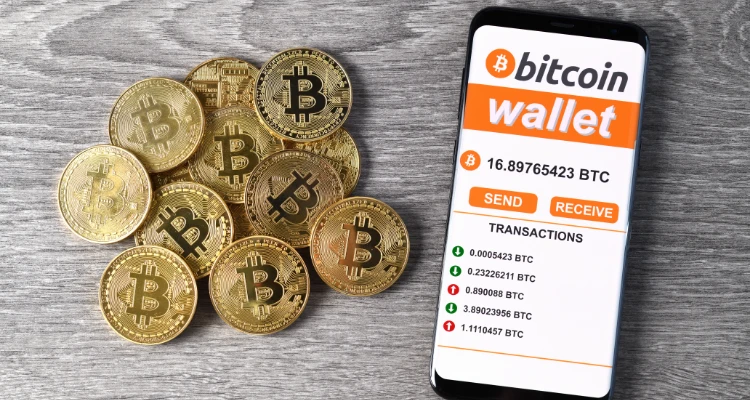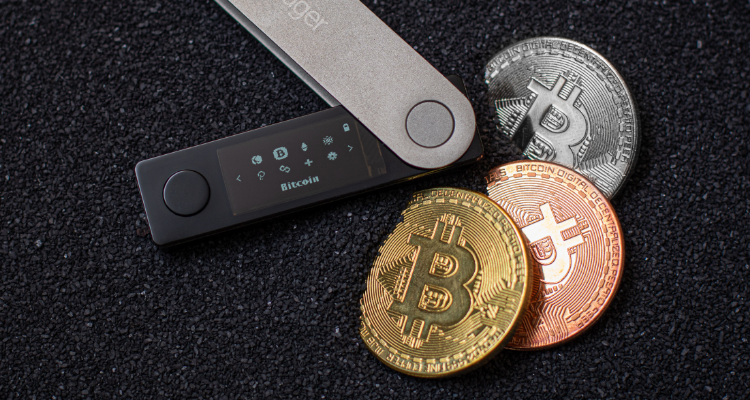What are the Best Bitcoin Wallets to Use in 2026?

We are witnessing an era that we have not seen in more than 100 years. Not since the Federal Reserve Act of 1913 where they introduced ‘Bank Notes’ to help promote a centralized banking system, have we seen the introduction of a new, legitimate currency.
In 2008, a white paper was developed on a new digital currency called ‘Bitcoin’ by an anonymous author named Satoshi Nakamoto. Nearly fifteen years on, the founder of the whitepaper has disappeared into obscurity and the currency has become the de facto currency for those looking for convenience, privacy and anonymity. Having matured, with an entire industry based around bitcoin, and a market cap of USD$2.02 trillion, it is more important now than ever to not only understand the transition we are in but what it means for the future of currencies as a whole.
If you own Bitcoin or plan to own some, you need to find a way to keep your Bitcoins safe, secure and easily accessible. This is done with a digital wallet. We are here to provide you with a guide on what could be the best Bitcoin wallet for you in 2024.
Disclaimer: We do not provide investment advice and in no way should this article be construed as such. Cryptocurrency is risky and highly speculative, with extremely volatile markets. We strongly recommend consulting with a qualified investment professional before making any financial decisions.
What is a Bitcoin Wallet and How Does it Work?

There are almost as many BC wallets to choose from as there are bitcoin currencies and with bitcoin becoming a household term, many are looking to get ahead of the curve and start considering investing in the currency. But how do you store Bitcoin?
Simply put, Bitcoin wallets use and store a collection of “private and public keys’ to access your assets. Not unlike a physical wallet or a debit card, a Bitcoin wallet is password-protected (private keys) from unauthorized access. It is managed and controlled entirely by you, the owner. It is not shared, distributed or otherwise known to any other entity such as a financial or governmental institution. It works on Blockchain technology.
Your wallet is responsible for validating your Bitcoin transactions. You can make purchases or exchange assets with your wallet’s private keys. Because you have complete control and the blockchain offers cryptographic security, you can feel safe from bad actors who may otherwise hack your traditional assets, such as banks that hold your fiat currency.
There are an array of crypto exchanges offering services that allow you to buy and sell your currency. Many of them will offer an online or mobile wallet as part of their service.
Public and Private Keys
When you set up your wallet, you will receive a pair of keys: Public and Private.
These cryptographic keys can be used to spend, receive and track ownership of your cryptocurrencies. The public key grants those you do business with an address to transact with, while the private keys allow you to spend from that address.
Cold Wallet vs Hot Wallet
You should regard your wallet as your BC bank account which will fall into one of two primary classifications: ‘cold’ storage wallets and ‘hot’ storage wallets. It is your choice. Please bear with me while I attempt to break down these two complex options into their simplest terms and to demonstrate the difference between them.
A hot wallet is always connected to the internet, allowing you access to your investment at a moment’s notice, whereas a cold wallet is not connected to the internet and will be stored on a physical drive. This could be on USB, detached HDD, SSD or any other form of digital storage. That’s it.
You may hear reference to a ‘software wallet’ which refers to cloud and app-based wallets for mobile and PC. Hardware wallets refer to physical storage devices.
Cold storage wallets that remain offline are a clear choice for those whose primary concern is security. We have all heard of the stories of crypto owners losing their drives and spending years looking for it.
Types of Storage Wallets
Cryptocurrency wallets come in five primary formats:
Mobile
Desktop
Online
Hardware
Paper
We will focus on the first four which are most common.
Mobile Bitcoin Wallets
When accessing your bitcoin wallet on mobile, it is done through a mobile app. You use the app for all of your day-to-day transactions, whether purchasing or trading on your mobile device. Because you are accessing your wallet through an online device, you will often see QR codes used to scan for Bitcoin purchases at a point-of-purchase.
Online Wallet
Using the SaaS (Software as a Service) model, an online or web wallet works from the cloud and grants the user access to their Bitcoins through any devices where they store their private keys. You can manage a large number of cryptocurrencies with this type of storage and it is one of the quicker ways to complete transactions.
Like any online company or website, an online wallet or exchange is vulnerable to attacks, which makes this wallet commonly known as one of the least secure forms of storage.
Desktop Wallet
By storing your wallet on a desktop computer, you will be storing them offline on your system’s physical hard drive. This is superior to the mobile app as the coins are stored in offline mode and only accessible on the downloaded computer. This also leaves your coins vulnerable in the event of a virus attack on your machine.
Hardware Crypto Wallets
A bitcoin hardware wallet is the safest option for storing your keys and virtual coins. They are stored on external hardware devices such as a hard drive or USB. This is because it remains offline and transactions remain offline until the device is connected. The cold storage providers will mail you a device that has a screen and user interface for managing your crypto account. Again, just keep it in a physically safe location.
How to Choose a BC wallet
Now you have the knowledge to determine which crypto wallet is most suitable for you. If you are just starting out, then you should consider a free or low-fee wallet for transactions.
If you are a more experienced user, you will likely want a hardware wallet to secure your investment. It also depends on how literate you are with computers. But again, these are choices that you must make.
Let’s dive into some of the more popular wallets and determine the best bitcoin wallet in 2022.
Learn How to Set up, Buy and Trade Bitcoin.
Bitcoin Wallet Comparison
Cold Wallets
Background: Any of the Ledger wallets are a good choice. The Nano X is a highly secure wallet, they have sold 1.1 million wallets, operate in 165 countries, and have been around since 2014.
Features:
Good value
High-speed transactions
Provides free shipping to almost every country
One of the most well-regarded wallets available
Great for beginners, includes tutorials and other resources
Background: This is one of the more expensive wallets available. They were one of the earliest wallets available, establishing themselves in 2014, Trezor wallets offer unbelievable support and premium features. You can access up to 7000 different cryptocurrencies and assets.
Features:
Supports most languages
More than 600 cryptocurrencies supported
Plenty of resources for beginners to get you started
Single transactions can be sent to multiple recipients
Compatible with Windows, OS X, Linux, and Android via OTG support
Background: One of the more popular Cold wallets with more than 1.4 million sold. This wallet is small, discrete, about the size of a lighter and features only two buttons and a tiny screen.
Features:
Very affordable
Easy for beginners
Can also be used with web wallets
23 cryptocurrencies directly supported
Store Bitcoin up to 107+ and 1,000+ tokens
Security features make it impossible to hack
Does not limit you to just Ledger Live, as the hardware wallet
Compatible with Android, iOS, OS X, Windows, Linux, and Trezor
Background: One of the latest entries into the DeFi category, offering convenience without sacrificing decentralized security.
Features:
It has the form factor of a credit card
Enhanced security and encrypted Bluetooth communication
Multi-layer cold storage security through its EAL6+ secure element (SE)
Tamper-free and water-resistant
Hot Wallets
Background: Founded in 2015 Exodus prides itself on selling to the mainstream, with its goal being making crypto easy to use for anyone, regardless of tech-savvy and experience.
Features:
Ease of use
24/7 support
Great charting features
Updated every two weeks
Supports ShapeShift
Mobile and desktop friendly
Support 100+ cryptocurrencies
An abundance of resources on their website
Integrates with Trezor Model T and Trezor One
Background: Founded in 2008, what makes this award-winning app so reliable is the dedicated team of designers and engineers.
Features:
Very high security
Offline transactions available
Free to download and get started
Compatible with Trezor and Ledger
Available for mobile users on Android and iPhone
Make payments, transfers, and exchange cryptocurrencies
Background: Acquired by Binance in 2018, this is the official wallet of Binance Smart Chain or Binance Chain and will require this wallet if you intend to trade on Binance.
Features:
Can handle a wide range of cryptocurrencies
Keeps most of its currency on cold storage servers
A formidable array of features contribute to a reputation for solid security
Security options to use Two-Factor Authentication, Google Authentication, and even SMS or email verifications
Background: Coinbase is not a traditional crypto wallet, but due to its mainstream adoption, should be included in this list. It is a cryptocurrency exchange that offers more of a secure app as part of its platform.
Features:
No account required
Regulated in the USA
Listed on NASDAQ
500+ tokens support
Very easy to buy, sell and trade
The most used wallet in the world
Final Thoughts
Technology has afforded us with goals that we have never dreamed of. As we continue to evolve and new and innovative technologies emerge, those who are ahead of the curve will receive the spoils.
As we have outlined, bitcoin wallets come with a spectrum of features depending on your wants, needs, and lifestyle. You can choose from a hardware wallet, offline wallet, desktop and mobile wallet or a platform-based wallet like Coinbase.
Regardless of whether you are just getting into bitcoin or if you are an old pro shopping for a new wallet, these are all great options, depending on what features you are looking for, specifically.
If you are a crypto enthusiast and are considering buying or renting a reliable server, ServerMania will walk you through all of your options….and we also accept Bitcoin.
Was this page helpful?

